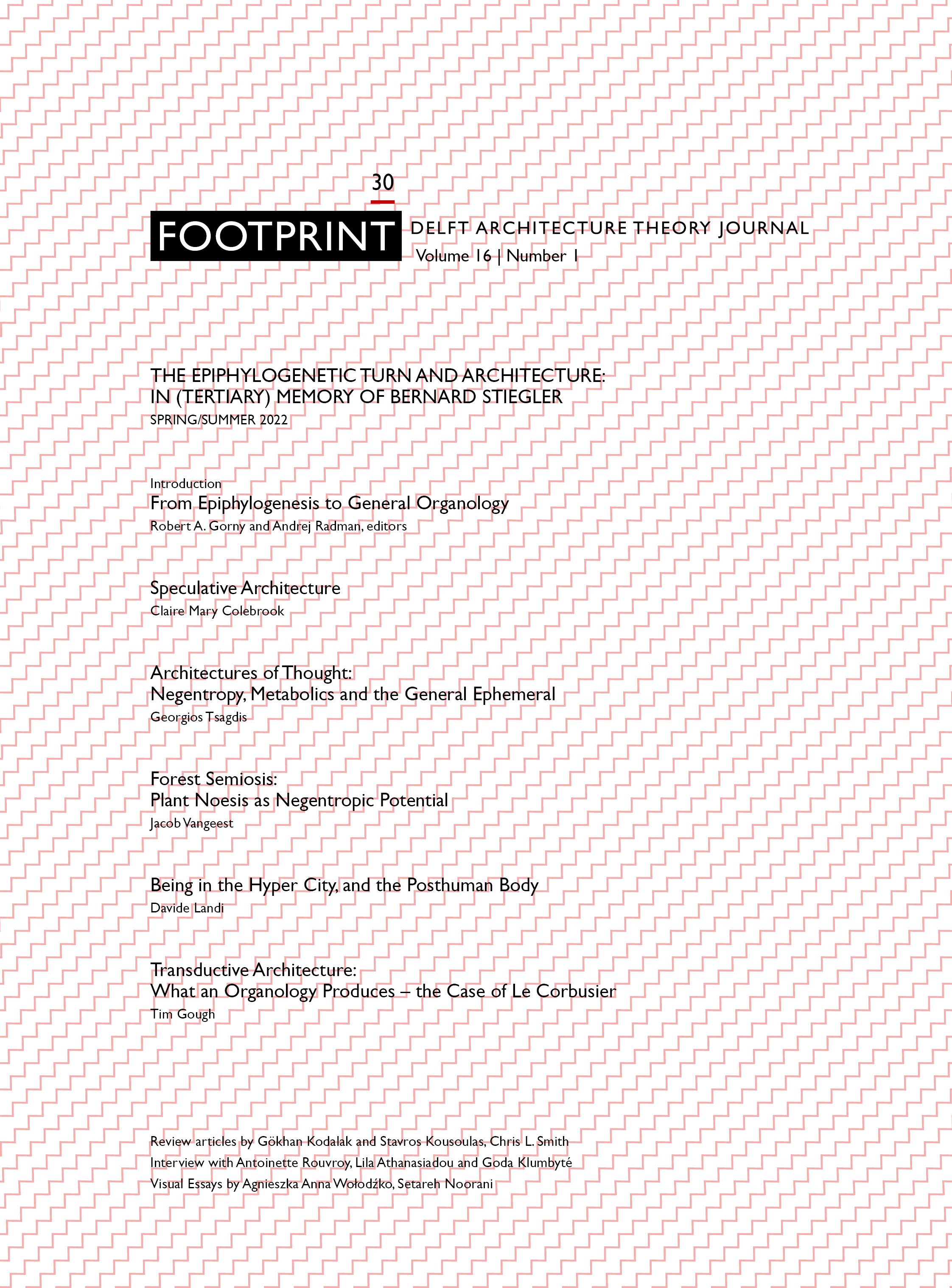From Epiphylogenesis to General Organology
DOI:
https://doi.org/10.7480/footprint.16.1.6291Abstract
Epiphylogenesis is a neologism coined under Stiegler’s anthropotechnical theorisation of the co-evolution of brains and tools. In line with feminist and decolonial theorists like Claire Colebrook and Kathryn Yusoff, it foregrounds that there has never been such a thing as ‘the human’. There are only differentiation processes that historically make humans who they are, and do so in different ways. As such, it has gained some currency in a stream of neo-materialist theories that have revisited anthropogenesis, or the quasi-causality of becoming human, that operates by way of progressively differentiating environments and technics. In addition to primary memory as the genetic information expressed in DNA and secondary memory acquired epigenetically through a complex nervous system, there is also tertiary memory, which Stiegler named ‘epiphylogenetic’. It is the accumulation and retention of historical epigenetic differentiations within the spatio-temporal organisation of material environments. Specifically, the formation of organisational technics includes writing, art, clothing, tools, and machines, but also architecture and urban planning. This outsourcing of memory from the organic changes the conditions for further phylogenetic becomings, given that evolutions continue to be extrinsically organised (‘ex-organised’) by associated technicised milieus.
References
Abbinnett, Ross. The Thought of Bernard Stiegler: Capitalism, Technology and the Politics of Spirit. London: Routledge, 2019.
Abel, Chris. The Extended Self: Architecture, Memes, and Minds. Manchester: Manchester University Press, 2014.
Barnet, Belinda, and Andrés Vaccari. ‘Prolegomena to a Future Robot History: Stiegler, Epiphylogenesis and Technical Evolution’, Transformations 17 (2009).
Barnet, Belinda. ‘Technical Machines and Evolution.’ ctheory.net (2004).
Braidotti, Rosi. The Posthuman. Cambridge: Polity, 2015.
Braidotti, Rosi. Nomadic Subjects: Embodiment and Sexual Difference in Contemporary Feminist Theory. New York: Columbia University Press, 1994.
Braidotti, Rosi. Posthuman Feminism. Cambridge/Medford: Polity, 2022.
Brouwer, Joke, and Sjoerd van Tuinen. To Mind is to Care. Rotterdam: V2, 2019
Canguilhem, Georges. ‘Machines and Organism’. In Incorporations. Edited by Jonathan Crary and Sanford Kwinter, 45–69. New York: Urzone, 1992.
Colebrook, Claire. ‘Epigenesis and Outside’. In Deleuze and Evolutionary Theory, ed. Michael J. Bennett and Tano S. Posterano, 159–82. Edinburgh: Edinburgh University Press, 2019.
Colomina, Beatriz, and Mark Wigley (eds.). Are We Human: Notes on an Archaeology of Design. Zurich: Lars Müller, 2016.
Fitzpatrick, Noel, Neil O’Dwyer, and Michael O’Hara (eds.). Aesthetics, Digital Studies and Bernard Stiegler. London: Bloomsbury Academic, 2021.
Frichot, Hélène. Creative Ecologies: Theorizing the Practice of Architecture. London: Bloomsbury, 2019.
Fry, Tony. Becoming Human by Design. London: Berg, 2012.
Fry, Tony. Defuturing: A New Design Philosophy. London: Bloomsbury, 2020.
Hall, Brian. ‘Epigenesis, Epigenetics, and the Epigenotype: Toward an Inclusive Concept of Development and Evolution’. In Beyond Mechanism: Putting Life Back into Biology. Edited by Adam Scarfe and Brian G. Henning, 348–71. Lanham: Lexington Books, 2013.
Haraway, Donna. Staying with the Trouble: Making Kin in the Chthulucene. Durham, NC: Duke University Press, 2016.
Head, Alex. Richochet: Cultural Epigenetics and the Philosophy of Change. Oslo: Ljå Forlag, 2021.
Howels Christina, and Gerald Moore, eds., Stiegler and Technics. Edinburgh: Edinburg University Press, 2013.
Hui, Yuk. On the Existence of Digital Objects. Minneapolis: University of Minnesota Press, 2016.
Hui, Yuk. Recursivity and Contingency. London: Rowman & Littlefield, 2019.
Hui, Yuk. The Question Concerning Technology in China: An Essay in Cosmotechnics. Falmouth: Urbanomic, 2016.
Jablonka, Eva, and Marion J. Lamb. Evolution in Four Dimensions: Genetic, Epigenetic, Behavioral, and Symbolic Variation in the History of Life. Cambridge, MA: MIT Press, 2005.
Jablonka, Eva. ‘Cultural Epigenetics.’ The Sociological Review 64, no. 1 suppl. (2016): 42–60
Kirby, Vicky. ‘Natural convers(at)ions: Or what if culture was nature all along?’ In Material Feminisms. Edited by Stacy Alamo and Susan Hekman, 214–36. Bloomington: Indiana University Press, 2008.
Lemmens Pieter and Bernard Stiegler. ‘The System Does Not Spark Pleasure Anymore.’ Krisis 1 (2011): 33–42.
Leroi-Gourhan, André. Gesture and Speech. Cambridge, MA/London: MIT Press, 1993.
Leroi-Gourhan, André. L’homme et Ia matière. Paris: Albin Michel, 1943.
Leroi-Gourhan, André. Milieu et techniques. Paris: Albin Michel, 1945.
Loo, Stephen. ‘Technics, Memory, and the Architecture of History.’ Interstices 13 (2012): 4–10.
Lotka, Alfred J. ‘The Law of Evolution as a Maximal Principle’. Human Biology 17, no. 3 (1945).
Malabou, Catherine. Before Tomorrow: Epigenesis and Rationality. Translated by Carolyn Shread. Cambridge: Polity 2016.
Mbembe, Achille, and Nils Gilman. ‘How to Develop a Planetary Consciousness.’ Noema Magazine 11 (January 2022).
Mbembe, Achille. ‘Necropolitics’. Translated by Libby Meintjes. Public Culture 15, no.1 (2003): 11–40.
Mbembe, Achille. Necropolitics. Translated by Steven Corcoran. Durham/London: Duke University Press, 2019.
Odling-Smee, John. ‘Niche Inheritance: A Possible Basis for Classifying Multiple Inheritance Systems in Evolution.’ Biological Theory 2, no. 3 (2007): 276–89.
Parisi, Luciana. Abstract Sex: Philosophy, Bio-Technology and the Mutations of Desire. New York: Continuum, 2004.
Radman, Andrej. ‘Allagmatics of Architecture: From Generic Structures to Genetic Operations (and Back)’. In Contingency and Plasticity in Everyday Technologies. Edited by Natasha Lushetich, Iain Campbell, and Dominic Smith (London: Rowman & Littlefield, forthcoming).
Radman, Andrej. ‘Ecologies of Architecture’. In Posthuman Glossary. Edited by Rosi Braidotti and Maria Hlavajova, 117–20. London: Bloomsbury, 2018.
Radman, Andrej. Ecologies of Architecture: Essays on Territorialisation. Edinburgh: Edinburgh University Press, 2021.
Rawes Peg (ed.). Relational Architectural Ecologies: Architecture, Nature, Subjectivity. London/New York: Routledge, 2013.
Scarfe, Adam. ‘Epigenetics, Soft Inheritance, Mechanistic Metaphysics, and Bioethics’. In Beyond Mechanism: Putting Life Back into Biology. Edited by Adam Scarfe and Brian G. Henning, 372–408 Lanham: Lexington Books, 2013.
Schrödinger, Erwin. What is Life?, with Mind and Matter and Autobiographical Sketches. Cambridge: Cambridge University Press, 1992.
Stiegler, Bernard. ‘Elements for a General Organology’. Derrida Today 13.1 (2020): 72–94.
Stiegler, Bernard. ‘General Ecology, Economy, and Organology’. In General Ecology: The New Ecological Paradigm. Edited by Erich Hörl with James Burton, 129–50. London: Bloomsbury, 2017.
Stiegler, Bernard. Automatic Society, 1: The Future of Work. Translated by Daniel Ross. Cambridge: Polity, 2016.
Stiegler, Bernard. For a New Critique of Political Economy, trans. Daniel Ross. Cambridge/Malden: Polity, 2010.
Stiegler, Bernard. Nanjing Lectures. Translated by Daniel Ross. London: Open Humanities Press, 2020.
Stiegler, Bernard. Qu’appelle-t-on panser? 1: L’immense regression. Paris: Les liens qui libèrent, 2018.
Stiegler, Bernard. Qu’appelle-t-on panser? 2: La leçon de Greta Thunberg. Paris: Les liens qui libèrent, 2020.
Stiegler, Bernard. Symbolic Misery, 1: The Hyperindustrial Epoch. Translated by Barnaby Norman. Cambridge: Polity, 2014.
Stiegler, Bernard. Symbolic Misery, 2: The katastrophē of the Sensible. Translated by Barnaby Norman. Cambridge: Polity, 2015.
Stiegler, Bernard. Technics and Time 4: Faculties and Functions of Noesis in the Post-Truth Age. Translated by Daniel Ross (2021). Translation manuscript, available online at https://www.academia.edu/58785373/Stiegler_Technics_and_Time_4_Faculties_and_Functions_of_Noesis_in_the_Post_Truth_Age.
Stiegler, Bernard. Technics and Time, 1: The Fault of Epimetheus. Translated by Richard Beardsworth and George Collins. Stanford: Stanford University Press, 1989.
Stiegler, Bernard. Technics and Time, 2: Disorientation. Translated by Stephen Barker. Stanford: Stanford University Press, 2009.
Stiegler, Bernard. Technics and Time, 3: Cinematic Time and the Question of Malaise. Translated by Stephen Barker. Stanford: Stanford University Press, 2011.
Stiegler, Bernard. The Decadence of Industrial Democracies: Disbelief and Discredit 1. Translated by Daniel Ross and Suzanne Arnold. Cambridge: Polity, 2011.
Stiegler, Bernard. The Lost Spirit of Capitalism: Disbelief and Discredit 3. Translated by Daniel Ross. Cambridge: Polity, 2014.
Stiegler, Bernard. The Negantropocene. Translated by Daniel Ross. London: Open Humanities Press, 2018.
Stiegler, Bernard. Uncontrollable Societies of Disaffected Individuals: Disbelief and Discredit 2. Translated by Daniel Ross. Cambridge: Polity, 2012.
Van Camp, Nathan. Redesigning Life: Eugenics, Biopolitics, and the Challenge of the Techno-Human Condition. Bern: Peter Lang, 2015.
Weheliye, Alexander. Habeas Viscus: Racializing Assemblages, Biopolitics, and Black Feminist Theories of the Human. Durham/London: Duke University Press, 2014.
Wexler, Bruce. ‘Shaping the Environments that Shape Our Brains: A Long Term Perspective’ in Cognitive Architecture: From Bio-Politics to Noo-Politics. Edited by Deborah Hauptmann and Warren Neidich, 144–69. Rotterdam: 010 Publishers, 2010.
Yusoff, Kathryn. ‘Anthropogenesis: Origins and Endings in the Anthropocene’. Theory, Culture & Society 34, nos. 2–3 (2017): 105–27.
Yusoff, Kathryn. A Billion Black Anthropocenes or None. Minneapolis: University of Minnesota Press, 2018.
Downloads
Published
Issue
Section
License
Copyright (c) 2022 Robert Alexander Gorny, Andrej Radman

This work is licensed under a Creative Commons Attribution 4.0 International License.
- Authors retain copyright and grant the journal right of first publication with the work simultaneously licensed under a Creative Commons Attribution License that allows others to share the work with an acknowledgement of the work's authorship and initial publication in this journal.
- Authors are able to enter into separate, additional contractual arrangements for the non-exclusive distribution of the journal's published version of the work (e.g., post it to an institutional repository or publish it in a book), with an acknowledgement of its initial publication in this journal.





